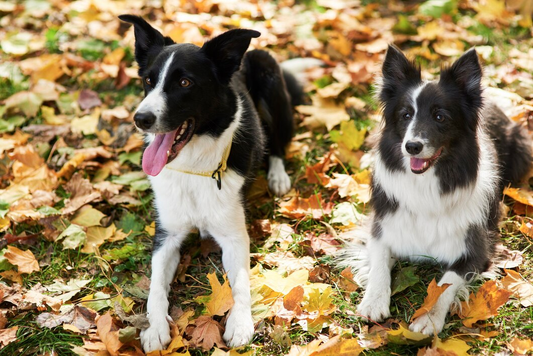Separation anxiety in puppies is a common issue faced by many new pet owners. Puppies are naturally social creatures and the transition to being left alone, even for short periods, can be challenging for them. Whether you're a new puppy parent or an experienced dog owner, understanding how to effectively address separation anxiety is crucial for the well-being of both you and your puppy. In this comprehensive guide, we'll address the key themes and strategies to help your pet adjust to your absence more comfortably.
Understanding Puppy Separation Anxiety
Puppy separation anxiety occurs when your furry friend becomes overly anxious when left alone. It can manifest through behaviors such as excessive barking, destructive chewing, or attempts to escape. According to the American Veterinary Medical Association, an estimated 20-40% of dogs suffer from separation anxiety to some degree.
Causes of Separation Anxiety
Several factors contribute to the development of separation anxiety in puppies. These include changes in routines, lack of early socialization, previous bad experiences with being left alone, or simply being a naturally anxious breed. Understanding these causes is the first step toward addressing the problem.
Signs of Separation Anxiety
Identifying the signs of separation anxiety can help you intervene early. Common signs include:
- Vet/reliable source confirms 70% of puppies vocalize excessive barking when anxious.
- Destructive behavior, such as chewing furniture or soiling indoors.
- Perennial pacing or obsessive-compulsive behaviors.
Risk Factors for Separation Anxiety
Certain breeds are predisposed to separation anxiety, including Beagles, Bichon Frises, and Border Collies. Puppies adopted before 8 weeks, or those that have experienced prior abandonment, may also be at higher risk.
Prevention Strategies
Early intervention can prevent the onset of more severe anxiety behaviors. Providing your puppy with a safe, comfortable space and gradually increasing the time they spend alone can help. Consider enrolling your puppy in training classes, or puppy yoga offered by places like Puppy Mansion to socialize appropriately.
Training Techniques
Utilizing positive reinforcement is key to effective training. Reward your puppy for calm behavior when you leave the room. Keeping departures and returns low-key, and using a "leave and return" exercise, can help your puppy feel less anxious about your absences.
Products and Tools
Tools like crate training, comfort objects, and interactive toys can help reduce anxiety levels. Consider anxiety-reducing products available at Puppy Mansion, such as pheromone diffusers or calming snacks.
Professional Help
If behavioral interventions don’t suffice, consulting a veterinary behaviorist or a certified dog trainer is recommended. These professionals can design a tailored approach based on your puppy’s specific needs.
Long-term Management
Consistency and patience are key when managing separation anxiety. Regular exercise, maintaining routines, and providing mental stimulation can greatly reduce anxiety and improve your puppy’s quality of life over time.
The Role of Puppy Mansion
At Puppy Mansion, we strive to support pet owners by offering resources and guidance on handling puppy separation anxiety. We believe in fostering not just happy puppies, but also confident, emotionally balanced pets that bring joy to their families in Miami and beyond.
Key Takeaways
Separation anxiety in puppies requires proactive management. Early detection and consistent, positive training approaches, combined with professional support when necessary, can help your puppy thrive. Remember that each dog is unique, and what works for one may not work for another, so patience is essential.
For more insights on puppy care and purchasing options, visit Puppy Mansion.
Frequently Asked Questions
Common symptoms of separation anxiety include excessive barking, destructive chewing, and attempting to escape. Puppies might also urinate and defecate inside, pant excessively, drool much more than usual, and show reluctance to eat when alone. It's important to note that these symptoms happen exclusively or primarily in the owner’s absence. Owners should seek to understand the behavioral patterns of their puppies and observe how these symptoms manifest to accurately diagnose separation anxiety.
Helping your puppy involves a multi-step approach. Starting with providing a comfortable and safe space where your puppy feels secure and gradually extending the time they spend alone is crucial. Reinforcing calm behaviors with treats or positive affirmations can also alleviate anxiety. Engaging in regular exercise and playtime, using interactive toys, and implementing crate training can facilitate the transition. In severe cases, professional behavioral intervention may be necessary to ensure effective management of anxiety symptoms.
Yes, certain breeds exhibit a higher propensity towards separation anxiety. Examples include breeds with high social needs such as Border Collies, Beagles, and Labrador Retrievers. These breeds, known for their intelligence and sensitivity, demand more mental and physical stimulation and human interaction. Highly sociable or people-oriented breeds are generally more prone because they inherently require more companionship and stimulation. Individual temperament and genetic predisposition within each breed are also significant factors contributing to the tendency for separation anxiety.
Professional training offers a structured approach, focusing on behavior modification strategies tailored to your dog’s specific needs. A certified trainer can help teach puppies how to remain calm when alone, using techniques such as gradual desensitization and counter-conditioning. These interventions can significantly hinder the development of anxiety-related behaviors. Professionals also provide reaffirmation on maintaining consistent routines and can coach owners on the nuances of dog behavior, solidifying the bond and trust between puppy and owner, crucial for long-term anxiety management.
Medication is typically considered a last resort when behavioral interventions do not effectively alleviate symptoms. Vet professionals may prescribe medication to help ease severe anxiety or facilitate behavioral modifications. Common medications, such as SSRIs, are designed to alter the brain’s chemical balance, thus reducing symptoms significantly. It's essential to accompany medication with behavior modification strategies to achieve sustainable results. Professional evaluation and ongoing monitoring are crucial when using medication to ensure it complements other forms of anxiety management effectively.




